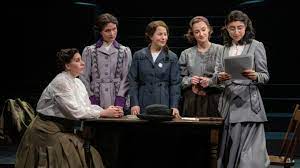
I must admit I was not a fan of the movie Titanic. The boat sinking was impressive though. I was in the minority as the film was a smash hit and a cultural touchstone. Certain youthful identifiers have come together to revisit, lambast and celebrate this watershed moment in cinematic history. Titanique is utterly hilarious.
With a Judy Garland and Mickey Rooney inspired “let’s put on a show” vibe, three friends conceived this silly, wildly entertaining vehicle for themselves and, happily, for us. This show started downtown in a basement and now has transferred to a larger Off-Broadway house. The night we attended the theater was packed. An energetic fan base ate this campy confection up rabidly.
Titanique is a musical spoof of the film. The story here recounts the famous love story and brings aboard some familiar characters as well. In this reunion of sorts, however, Celine Dion remembers herself in the film not simply belting out the theme song “My Heart Will Go On”. She will plunge herself headfirst into the fray and make sure no one, absolutely no one, gets to be the star over her. Diva worshippers should pounce on this merriment.
The book was written by Marla Mindelle, Constantine Rousouli and Tye Blue. The laughs are voluminous referring back to the Oscar winning picture while also liberally sprinkling more current, often gay, references. Because the surprises are so important and supremely additive to the fun quotient, I will not spoil them here.
Ms. Mindelle is our star, Celine Dion. The exaggerated mannerisms are spot on. It’s a wink wink performance that’s well sung given the real Celine’s vocal chops. Mr. Rousouli plays Jack Dawson, the role made famous by Leonardo DiCaprio. His is an appealing take on the standard issue upstairs/downstairs love triangle. The ending of the film was a trifle stupid and these clowns make sure we remember that.
The third writer, Mr. Blue, directed this vigorously staged musical comedy. There are no lulls. Scenes whisk by just like the extra speed the Titanic took before running into some real trouble. This show is a party and the guests gleefully drink it up. The theater bar provides the bring to your seats thematic cocktails.
The show has a nice handmade quality to the props. Costumes (Alejo Vietti) are appropriate and witty. None of this would work if the performers were not up to the combination of sharp ridicule and blithesome adoration. They are.
Frankie Grande is a scene stealer portraying multiple roles including Victor Garber not as the character in the film but as the actor himself. Avionce Hoyles is the Iceberg. Damage will be done as she figuratively stops the show cold. Russell Daniels’ Ruth Dewitt Bukater is a star turn. John Riddle is highly memorable as the jilted contradiction that is bad guy Cal. Everyone on stage is full throttle as required in a musical which is gigantically over-the-top.
The Titanic story is one of the most famous disasters in history. Titanique is far from a theatrical catastrophe. Fun seeking theatergoers should book passage. You will be doomed to have a great time.
Titanique is running at the Daryl Roth Theatre off Union Square. Tickets are currently on sale through February 2023.










You must be logged in to post a comment.